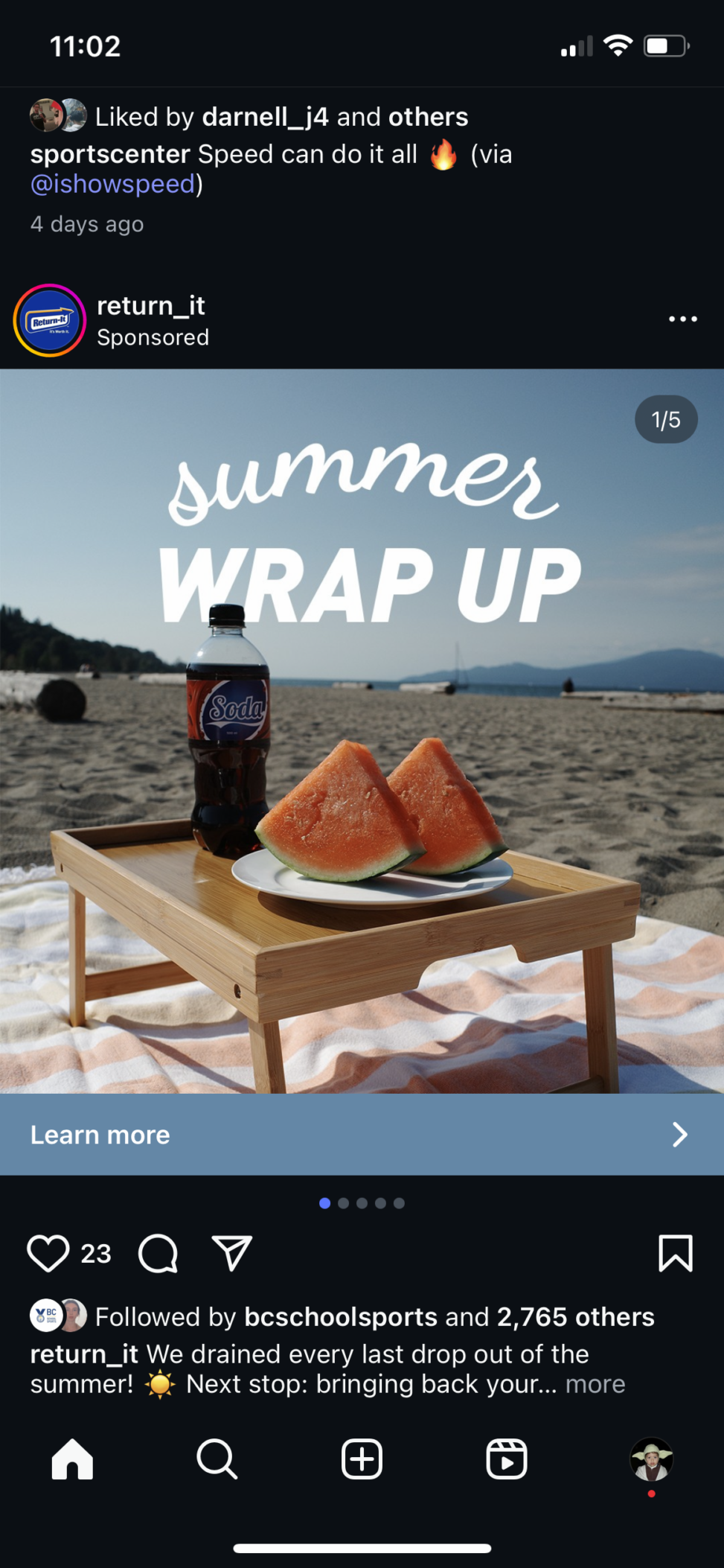Return Its advertisement illustrates an eco-friendly message to dispose of recyclables correctly. Return it is a non-profit organization that pushes towards proper disposal of plastics to reduce harm to the environment. Return it created a twenty-five yearlong social purpose on searching solutions for plastic waste in Oceans and water ways, recycling 80% of plastic beverage containers sold in British Columbia, improving recycling systems, fazing out single use plastic films, and decarbonizing the transportation by using hybrid natural gas trucks. Return its systems work with a small tax being added to bottles at purchase and that tax being returned when you properly recycle the bottle at the depot. Return it hopes to expand their systems worldwide to fight single use products.
Return it has great intentions and they demonstrate it well. In the advertisement they have a photo of two nice pieces of ripe watermelon with an unbranded soda bottle on a little wood table at the beach with the words “Summer Wrap Up”. The focal point is on the bottle and watermelon while the beach is blurred out in the back due to a low aperture and the text is placed behind the bottle. The words “Wrap up” are in a white bold text which incentivises people to clean up after themselves. The image represents a place where people commonly leave garbage. This reminds individuals to dispose properly in these areas and when individuals do go to the beach they are reminded of the advertisement and clean after themselves. The image has a desaturated background with a more prominent coral red colour coming from the blanket and watermelon. The whites are quick exposed as well. These two are the Canadian flag colours and during summer is when Canada day takes place. Return it is a fully Canadian brand, thus the colours in the image provide a sense of patriotism. Return its social purpose of increasing recycled bottles to 80% is heavily owed to these small advertisements which create light reminders to dispose properly of bottles.
This advertisement is targeted to young adults due to them being the age group with the lowest recycling rate according to a study done by DS Smith. Gen Z only recycles 19% of their waste compared to boomers which recycle 54%. Geographically, this advertisement targets residents of British Columbia as Return it is only works in said province. The image in the advertisement was taken at a popular beach in downtown Vancouver called Third Beach. The importance of this is the communal sense it gives viewers as it is a recognizable location that many people from British Columbia are familiar with. The effectiveness of this advertisement is prevelant in British Columbia. A study done by Alistair Hill shows that just seeing an advertisement even if one does not recall what the advertisement was, they are 10.2% more likely to recognize the brand.
The importance of Return Its social purpose goes far beyond environmental costs. The personal health benefits of reusable plastics go far beyond expectations. Most single use plastics contain carcinogenic, mutagenic, or reprotoxic substances that contaminate foods causing harm to the consumer. These substances can lead to disruption in cellular development, causing cancer cells to be produced. The indirect effects of single use plastics are just as threatening. Over 400 million tons of plastic are produced a year in the world only 9% of that is recycled, 12% is incinerated causing global warming, and lastly 79% of plastic waste is found in landfills, dumps and thrown into the eco system. These plastics contaminate drinking water for millions of people causing harmful sicknesses to take lives. With no other option, these people are forced to drink this water. Return Its social purpose eliminates these threats by putting recyclable plastics through various tests, eliminating all carcinogenic, mutagenic, or reprotoxic substances. They develop systems to incentivise people to recycle which in turn, leads to less polluted sources of water. These plans help extend the human life span and aid live better lives in a better world.
To summarize everything that has been stated, Return it seeks to develop a healthier planet and lifestyle for all by achieving their twenty five year long social purpose and reducing the number of waste around the world by creating better recycling systems, phasing out single use plastics, decarbonizing transportation. Return its advertisements are tailored to generation Z and British Columbia residence as the image was taken at a popular beach in the highest populated city in the province. Their advertisment is effective due to the psychological hook social media marketing has on individuals’ subconsciousness. This effect causes individuals to subconsciously recognize brands even if one does not recall seeing the advertisment. With all things in consideration Return it has a great social purpose with effective advertisements to increase recyclable plastic use.


Lakshyadeep singh(T00729505)
Alessandro Boggio’s organizational analysis of the Return-It ad is good and effectively highlights the firm’s social and environmental goals. The student is great in describing the visual content of the ad, such as the patriotic color symbolism and location on Vancouver beach as they establish a sense of belonging and patriotism. These visual messages are then neatly connected to the organization’s broader organization objective of instilling the recycling habit in young adults.
However, while analysis is in-depth, it leans more towards praising Return-It’s positive green messaging than scrutinizing it critically. Criticism of potential greenwashing—how a company is exaggerating or glossing over its environmental impact—is largely lacking. For instance, the student could have asked if Return-It’s campaigns necessarily reduce waste or primarily shift burden to consumers. Besides, the paper could explore whether hybrid natural gas trucks and recycling facilities continue to produce emissions or plastic micro-waste, revealing possible inconsistencies in the green image of the brand.
The academic evidence is robust and varied, supporting claims about recycling behavior, advertising psychology, and the dangers of plastic. The case would be made more convincingly, however, by integrating the sources more judiciously. On balance, this is an informed and image-conscious analysis, though it would benefit from a higher level of critical consideration of whether or not Return-It’s advertising has a tendency to oversimplify ecologically complicated matters.